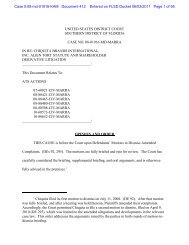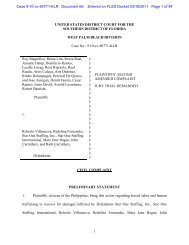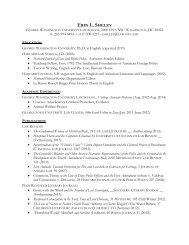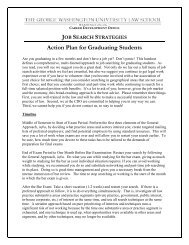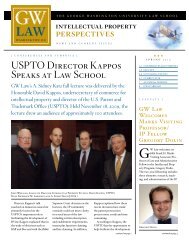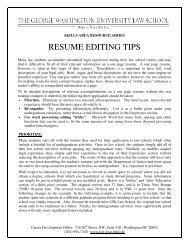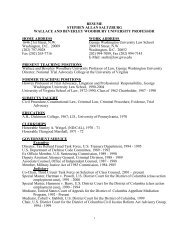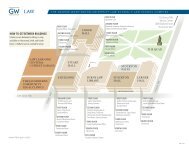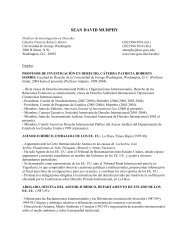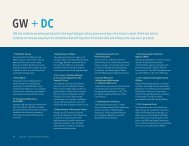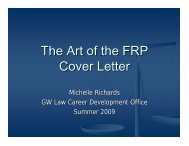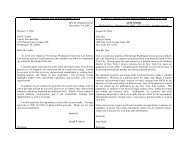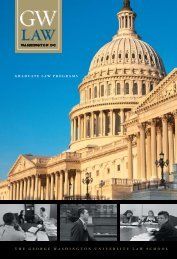CDO POLICIES AND PROCEDURES The following standards ...
CDO POLICIES AND PROCEDURES The following standards ...
CDO POLICIES AND PROCEDURES The following standards ...
- No tags were found...
You also want an ePaper? Increase the reach of your titles
YUMPU automatically turns print PDFs into web optimized ePapers that Google loves.
<strong>CDO</strong> <strong>POLICIES</strong> <strong>AND</strong> <strong>PROCEDURES</strong><strong>The</strong> <strong>following</strong> <strong>standards</strong> maintained by the Career Development Office apply to studentsparticipating in all GW Law School interviewing programs. Failure to adhere to thesepolicies and guidelines may result in one or more of the <strong>following</strong>:• loss of access to the <strong>CDO</strong> and its resources• a letter of reprimand from the Dean; and/or• sanctions under the Law School’s Policy on Academic Integrity in appropriate cases.Students subjected to any of the above sanctions may be obliged to report the matter tothe appropriate officials when seeking bar membership.National Association for Law Placement: Principles and Standards for LawPlacement and Recruitment Activities<strong>The</strong> GW Law School actively participates in the National Association for Law Placement(NALP), an employer/law school membership organization. In support of NALP’smission of research and education, the association has developed a strong statement ofethical <strong>standards</strong> which projects the membership’s interests as they relate to the legalrecruitment and placement process.<strong>The</strong> GW Law School fully subscribes to the principles set forth in the organization’sPrinciples and Standards, which address candidates seeking employment. <strong>The</strong> CareerDevelopment Office expects all students to be familiar with and abide by these principles.A complete copy of the NALP Principles and Standards is provided at the end of thissection.Please be aware that employers who are not members of the NALP organization may notabide by nor subscribe to these procedures. With few exceptions, those employersconducting campus interviews at the GW Law School will be NALP members and willimplement these procedures. If in doubt, ask at the time an employment offer is made.Students will be held responsible for fully understanding and adhering to the provisionsas set forth by NALP.NALP’s Principles and Standards do not condone rescinding offers. However, inrecognition that rescission does occasionally occur, NALP provides guidelines for theemployers, career offices, and students for ameliorating the situation.<strong>The</strong> Career Development Office has established policies which provide for furtherimplementation of the NALP Principles and Standards. <strong>The</strong>se additional policies weredeveloped to promote the best interests of the individual student, the general student
ody, and GW Law School. Non-compliance with either the NALP Principles andStandards or the Career Development Office Policies may result in the loss of the use ofCareer Development Office services.Principles for CandidatesCandidates should prepare thoroughly for the employment search process.Candidates should comply with the placement policies and procedures of law schoolswhose services they use.Before beginning an employment search, candidates should engage in thorough selfassessment.Work skills, vocational aptitudes and interests, lifestyles and geographicpreferences, academic performance, career expectations, and life experience should becarefully evaluated so that informed choices can be made. General instruction should beobtained on employment search skills, particularly those relating to the interview process.Prior to making employment inquiries, candidates should learn as much as possible abouttarget employers. Candidates should interview only with employers in which they have agenuine interest.Throughout the employment search process candidates should represent theirqualifications and interests fully and accurately.Candidates should be prepared to provide, at employers’ request, copies of all academictranscripts.Under no circumstances should academic or biographical data be falsified,misrepresented, or distorted either in writing or orally. Candidates who engage in suchcontact may be subject to elimination from consideration for employment by theemployer, suspension or other academic discipline by the law school, and disqualificationfrom admission to practice by bar admission authorities.Candidates should be prepared to advise prospective employers of the nature and extentof their training in legal writing. Writing samples submitted as evidence of a candidate’slegal skills should be wholly original work. Where the writing was done with others, thecandidate’s contribution should be clearly identified. Writing samples from law-relatedemployment must be masked adequately to preserve client confidentiality and used onlywith the permission of the supervising attorney.Throughout the employment search process, students should conduct themselves in aprofessional manner.Candidates who participate in the on-campus interview process should adhere to allscheduling commitments. Cancellations should occur only for good cause and should bepromptly communicated to the Career Development Office and the employer.
Invitations for in-office interviews should be acknowledged promptly and accepted onlyif the candidate has a genuine interest in the employer.Candidates invited to interview at employer offices should request reimbursement onlyfor ordinary and necessary expenses which are directly related to the interview andincurred in good faith. Failure to observe this policy, or falsification or misrepresentationof travel expenses, may result in elimination from consideration for employment or therevocation of offers by employers. Candidates expecting reimbursement for travelexpenses should reach an understanding with the employer prior to the trip. Expenses fortrips during which candidates interview with more than one employer should be proratedin accordance with those employers’ policies.First semester first-year students shall not initiate contact with prospective employersbefore December 1.Candidates should notify employers and the Career Development Office of theiracceptance or rejection of employment offers by the earliest possible time, and no laterthan the time established by rule, custom or agreement.Candidates should expect and request offers to be confirmed in writing. Candidatesshould abide by the <strong>standards</strong> for student responses set out in Part V (of the principles)and should always respond in writing to offers as soon as their decision is made, even ifthat decision is made in advance of the prevailing deadline date.In fairness to both employers and peers, students should act in good faith to declinepromptly offers for interviews and employment which are no longer being seriouslyconsidered. In order for law schools to comply with federal and institutional reportingrequirements, students should notify the Career Development Office of acceptance of anemployment offer, whether or not the employment was obtained through the office.Candidates seeking or preparing to accept fellowships, judicial clerkships, or otherlimited term professional employment should appraise prospective employers of theirintentions and obtain a clear understanding of the employer’s offer deferral policies.Candidates should consider the acceptance of an offer a binding obligation.Candidates should, upon acceptance of an offer of employment, immediately withdrawfrom consideration with all other employers. If, because of unforeseen circumstances, itbecomes necessary for a candidate to request release from or modification of his or heracceptance, both the employer and the Career Development Office should be notifiedpromptly.Students who engage in law-related employment should adhere to the same <strong>standards</strong> ofconduct as lawyers.In matters arising out of law-related employment, students should be guided by the<strong>standards</strong> of professional conduct which are applicable in the employer’s state. When
acting on behalf of employers in a recruitment capacity, students should be guided by theemployer principles in Part IV of the principles.Students should exercise care to provide full and fair information when advising peersabout their former employers.Candidates should promptly report to the <strong>CDO</strong> any misrepresentation, discrimination orother abuse by employers in the employment process.GENERAL <strong>CDO</strong> OFFICE <strong>POLICIES</strong><strong>The</strong> <strong>following</strong> policies govern student participation in Career Development Officeservices and programs. <strong>The</strong>y are designed to maintain a standard of equality andprofessionalism.<strong>CDO</strong> Appointment PolicyIf a student signs up for an appointment with a Career Development Office staff memberor registers to attend a workshop or any other <strong>CDO</strong>-sponsored event, s/he is expected togive the <strong>CDO</strong> appropriate notice if s/he is unable to keep the appointment or attend theevent. Failure to give appropriate notice (especially if repeated) may result in suspensionfrom further use of the Career Development Office.Interview Appointment PolicyThrough <strong>CDO</strong>-organized interview programs, students are given the opportunity to selectemployers with whom they would like to interview. In turn, employers devote asignificant amount of time and resources to reviewing student resumes and arranginginterviews. It is expected and required that students will interview with all employers thatselect them for interviews. Students who fail to honor their commitments compromisethemselves, fellow classmates and the Law School.<strong>The</strong> Career Development Office will excuse students from scheduling and attending aninterview under the <strong>following</strong> circumstances: 1) the student has accepted a job offer; or 2)there is a conflict of interest with the interviewer or firm (deemed legitimate by <strong>CDO</strong>).Students attempting to cancel an interview must contact the <strong>CDO</strong> prior to contacting theemployer.Students must notify the Career Development Office, via email or letter, at least threedays prior to the actual interview if one of the above criteria applies to them. It is alsorecommended that students who cancel a scheduled interview with an employer write aletter of regret as soon as possible. If a student fails to contact the <strong>CDO</strong> at least three daysprior to the actual interview, he/she will not be excused from the interview underany circumstances except for a serious illness.
Under advisement from the Dean, the Career Development Office reserves the right tosuspend services and programs to a student who disregards this policy.Call-Back Interview PolicyInvitations for in-office interviews should be acknowledged as soon as possible, but nolater than one week from receipt of the invitation and accepted only if the candidate has agenuine interest in the employer.After a student has accepted an offer of employment, s/he may not accept call-backinterviews from another organization (except in the case of the intent to split summeremployment between more than a single employer).Employment Offer Response PolicyStudents must respond to all offers in writing within the time frames set forth in theNational Association for Law Placement Principles and Standards (Part V).Offer Acceptance PolicyAt no time should a student accept conflicting or mutually exclusive offers ofemployment. Students should consider the acceptance of an employment offer a bindingobligation. Students who renege on an offer potentially will lose access to the <strong>CDO</strong> andits resources and be reported to the Dean’s Office.



